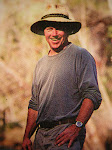Ichetucknee -
Wednesday
- 1/17/18
Today, like many days, I left the
river wishing I had more; more battery life in my camera; more layers of
clothes between me and the numbing cold; more aspirin for creaky knees that
protest long periods of kneeling on rocks. More than anything, I wished I had
more daylight. For the past four hours, I had been staring at a square yard of
Ichetucknee river bottom and the crowd of pea-sized Elimia snails that occupied
it. As often happens, I spent most of that time transfixed in a state of
fascination familiar to naturalists and cause for concern to all others.
By most people’s standards, it
had been an unremarkable wildlife encounter. In the time I watched, the most
ambitious snail of the group (what’s the collective of snails—a herd? An ooze?
A snooze?) was a rambunctious fellow who covered a good half a foot.
Looking back, I see now it was
the relative inactivity that made the scene remarkable. It forced me to shrink
my perception and see the world from the snail's eye-view. The irregular rocky
bottom that I had so often waded across and scanned with the nonchalance of a
lumbering giant was now a dramatic landscape. I gazed with a snail’s awe at
towering vertical cliffs and deep ravines. Fuzzy chara plants and the clump of
red Ludwigia I once kicked from my shoe were now monstrous outgrowths that any
adventurous snail with time to spare could make a career of exploring.
As I scanned this world I had so
often Gullivered over, I was consumed by the notion that this will be the only
world those hundreds of snails will ever know. Judging from the layers of
crushed white shells over which they crawled, it was clear they had inherited
this realm from countless generations of fore-snails.
Standing to take in the broader
view of the snail’s beautifully contoured homeland I was humbled. How could I
ever want more from my own vast world? I turned my gaze to the riverbed upstream and downstream of this
little community that now felt so familiar. The clear water allowed me to see other
submerged realms, other plateaus far removed from those at my feet, other
cliffs and other ravines; other glistening white valleys bedded with the shells
of that valley’s ancestors. I realized I was looking at worlds the snails in
“my” little community would never see.
As I turned and headed up the
hill, up from the river and into the dry upland, I was acutely aware that I was
entering a world my little snails could never even conceive. Nothing about it
would fit into their known reality. How do I rate? How could I wish for
anything more, when every one of the snails I just left will be dead by the
next spring of my life. A hundred generations of these snail’s descendants will
live and die—many of them in this same rocky plateau—by the time my own days
end. How do I rate?
A sliver of shade fell across my
eyes. I looked up to see it was cast by an old friend, a towering bald cypress
whose branches I’ve scanned many times, watching the comings and goings of
birds and other wildlife. This tree’s “knees” and my own have met many
times—causing at least one of us considerable pain.
I looked up into the expansive
canopy and thought about its ancient age. I wondered how many of my descendants
will pass through this shade. How many will knock their knees on its? I
wondered what worlds this mother of the forest will gaze upon that I can never
conceive.

2 comments:
Perception is everything in the "natural" world as well of our crazy everyday life. Thanks for another amazing post Lars.
Thank you very much, Kayak
Post a Comment